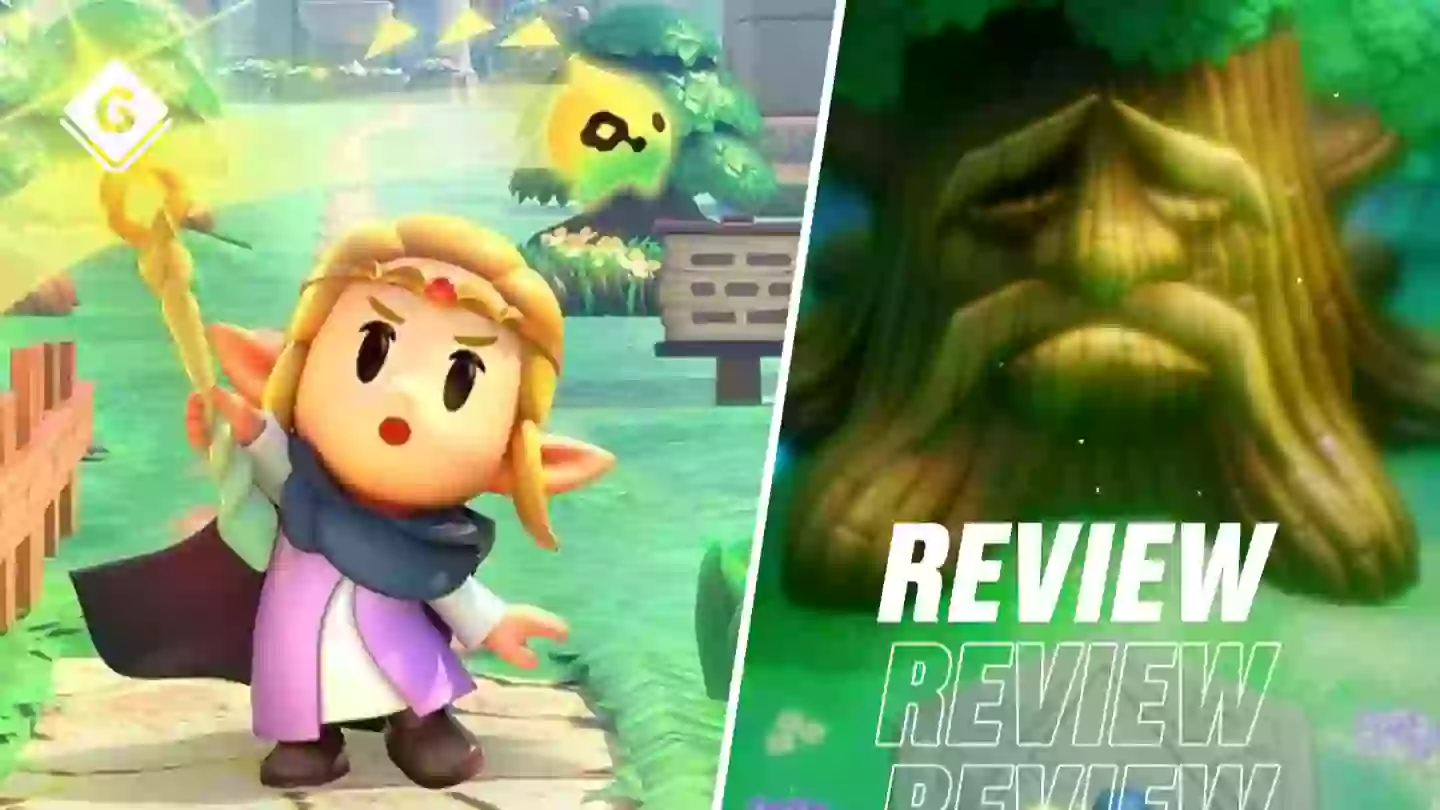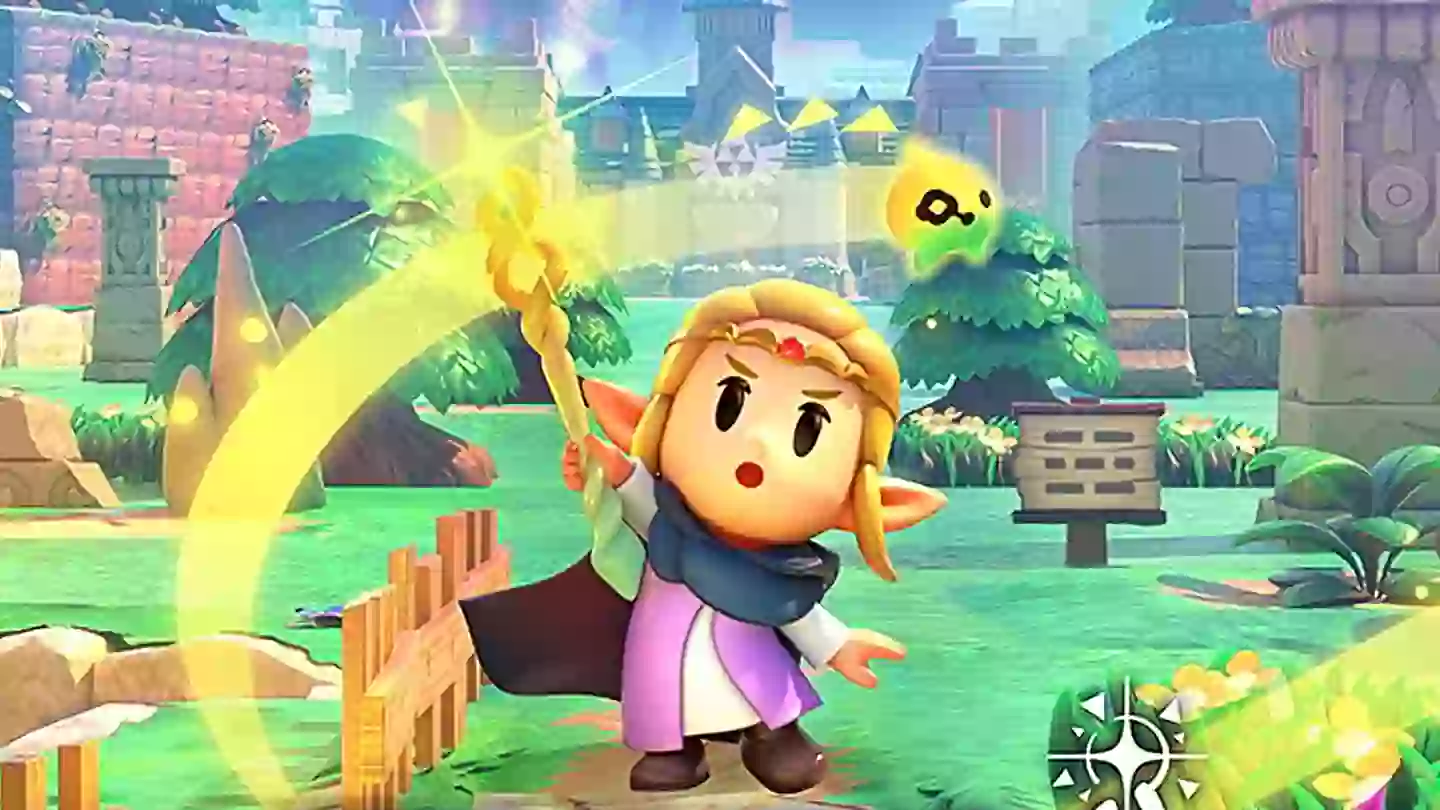
As far as video game superpowers go, I’d say the ability to produce a bed out of thin air and go to sleep anywhere is one I’ve really found myself coveting since finishing The Legend Of Zelda: Echoes Of Wisdom.
With the swish of a magic wand, Princess Zelda can summon a luxurious bed and immediately climb in, snoozing inches away from an active volcano, or in the heart of a raging sandstorm.
It’s a magnificent skill I’d wager anyone over the age of 25 wishes they could borrow, yet it’s merely the tip of the iceberg for Zelda in a game that asks you to let your imagination run wild with a vast toolbox of powers that makes even Link’s most stacked arsenal look like a box of second-hand magic tricks.
Advert
That such a game can exist in a franchise that’s fast approaching its 40th anniversary is a testament to Nintendo’s willingness to continually find ways to push the age-old formula in unexpected new directions. While not quite without its flaws, The Legend Of Zelda: Echoes Of Wisdom is constantly surprising, inventive, joyous, and utterly, ridiculously charming.
Echoes Of Wisdom begins where most Zelda games would end; a fully powered-up Link storms Ganon’s stronghold and dispatches him with ease. Things take a turn, however, when an otherworldly rift opens up and swallows the green-clad hero, leaving the princess to save Hyrule from this new threat. It’s DEI gone mad, I tell you.
Rather than leap into danger with a sword and shield, Zelda is gifted a magic rod that allows her to summon Echoes. Echoes range from everyday objects like plant pots and beds, to monsters like Moblin and Keese.
These Echoes must be tracked down throughout the game’s semi-open world before they can be used, and there are of course limits on how many Zelda can summon at any given time - though this can be upgraded as you mend the various rifts infecting Hyrule.
Advert
This magical device is, essentially, Zelda’s only weapon, but it’s one that opens the door to a universe of possibilities. Echoes Of Wisdom sits somewhere between traditional Zelda and Breath Of The Wild in terms of its world and the order in which you can complete certain dungeons, but within the framework of solving puzzles and fighting enemies, the game absolutely takes its cue from the series’ acclaimed 2017 reinvention.
In the past, a Zelda game would block players from scaling a cliff until they found the correct item that would grant them the ability to do so. In Echoes Of Wisdom you can summon several blocks of water, creating a tower that allows you to swim to the top. Or you might summon a spider, attach yourself to it, and follow its ascent. If that doesn’t suit you, why not call out a bird to fly you straight up, or build a stack of trampolines and bounce your way to your goal?
How you approach any given situation is entirely down to how much you’ve explored, what you’ve discovered, and how much you’ve been paying attention in regards to how various items interact with one another. That we’re able to do this in a game with classic Zelda dungeons - meticulously designed labyrinths that would traditionally have a very strict set of solutions - is quite remarkable.

Advert
In my time with the game, I’ve crossed chasms by building bridges out of beds, thrown exploding fish at sentient statues, glided across lakes of lava on the wings of a chicken, and bludgeoned enemies to death with a piece of raw meat. I’m not terribly proud of that last one.
Nintendo has, somehow, managed to transplant the “do what you like and see what works” approach from Tears Of The Kingdom and its predecessor and applied it to a much more familiar Zelda experience in a best of both worlds approach that I’d never have thought possible.
It’s not entirely seamless. The monsters Zelda can summon very much have a life of their own, and while you can attempt to guide them towards the desired target with a targeting system, I found this to be entirely hit and miss. Getting a spider to actually climb a wall requires you to summon it at just the right angle, and if you’re assuming a bird will fly you where you want to go, you really will end up hoping for the best as you dangle limply beneath a crow that’s happy to do its own thing.
This awkwardness extends to combat, where the targeting system really can fall apart in rooms full of enemies. On more than one occasion I found myself desperately attempting to focus on the nearest threat while the Moblin I’d summoned to protect me sat in the corner merrily throwing spears at the wall.
Advert
When combat does work, however, it’s an absolute joy. It can feel a little like Pokémon, summoning your favourite monsters to protect you while you skirt the edge of the room attempting to stay out of danger. And there’s very little risk of you simply spamming the same reliable monster each time, as certain beasts have certain strengths and advantages that mean you’ll have to consider what you’re facing and what will best serve you in the moment.
The prospect of finding stronger versions of certain monsters to defeat and then use in battle also adds a pleasingly robust dimension to exploration. I’d be keen on checking every cave or secret room for heart pieces and rupees anyway, but knowing one of the game’s many optional mini dungeons or challenges could end with a new and even more powerful monster variant was a brilliant extra reward.
If monster ranching really isn’t your cup of tea, you can also just embody the spirit of Link and rip into foes with a more familiar arsenal of weapons. Nintendo smartly ensures this skill is reliant on an energy bar, but a hidden collectible will allow you to upgrade the longevity and power of your time as the legendary swordsman.
Echoes Of Wisdom’s Hyrule is stupidly gorgeous, by the way. I was never massively convinced by the toybox aesthetic applied to the Link’s Awakening remake, but here it makes so much more sense and lends the world a charmingly tactile feel.
Advert

It’s also a world absolutely packed with things to do, and every single questline or secret area ends with a genuinely useful reward. There are heart pieces to find, secret rifts to close, optional bosses to conquer, accessories that can boost Zelda’s stats, and so much more besides. As someone who didn’t really love that a lot of the quests in Breath Of The Wild would end with little more than a handful of berries or a sword that would break in 11 hits, it feels good to have a world bursting with more robust remuneration.
Hyrule, never usually short of weird little guys who love building intricate challenges for Link, is also stacked with minigames in Echoes Of Wisdom. Whether you’re collecting stamps or foraging for acorns, there’s plenty to keep you occupied while Link rots in a magical prison. It’s about time he knew what it felt like to wait to be saved while someone else dicks around harvesting melons in exchange for rupees.
It may have taken nearly four decades, but the first mainline Zelda game with the titular princess in the lead role was worth the wait. This is a magnificent adventure that whizzes and pops with imagination, and proudly stands shoulder to shoulder with the very best of Link’s tales. If this is the Switch’s final Zelda game - and surely it has to be - then we’re going out on a high. It rules.
Pros: A gorgeous toybox world, loads to see and do, Echoes open up tons of possibilities
Cons: Echo AI isn’t perfect, combat can be a little fiddly
For fans of: Tunic, The Legend Of Zelda, Scribblenauts
9/10: Exceptional
The Legend Of Zelda: Echoes Of Wisdom is available 26 September for Nintendo Switch. A review code was provided by the publisher. Read a guide to our review scores here.
Topics: The Legend Of Zelda, Reviews, Nintendo, Nintendo Switch